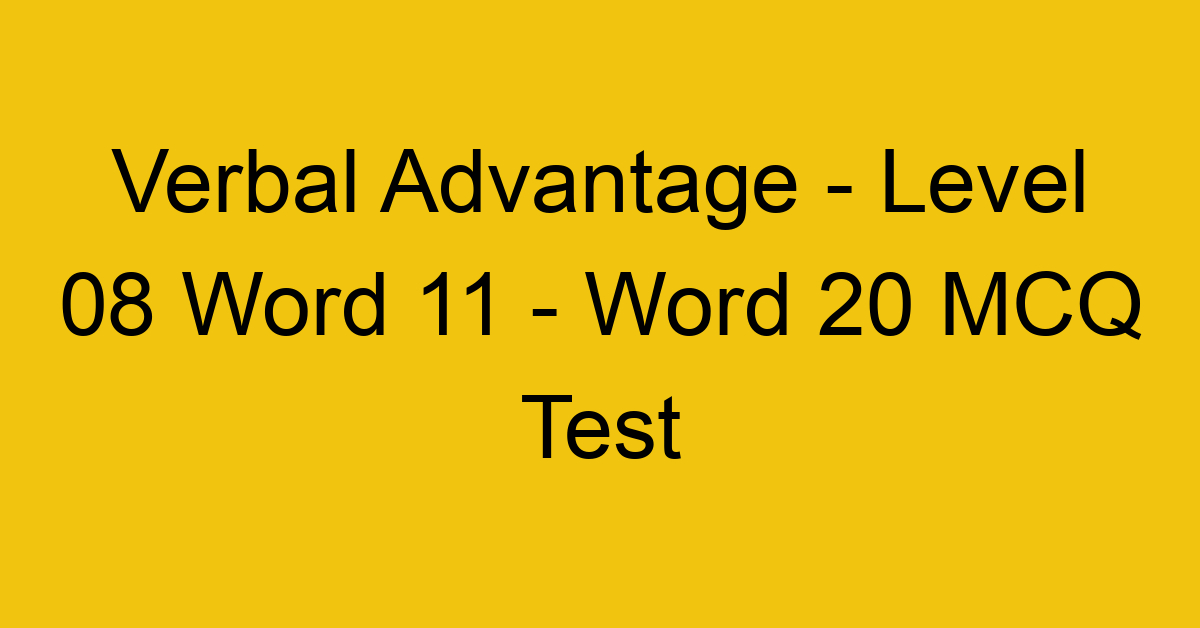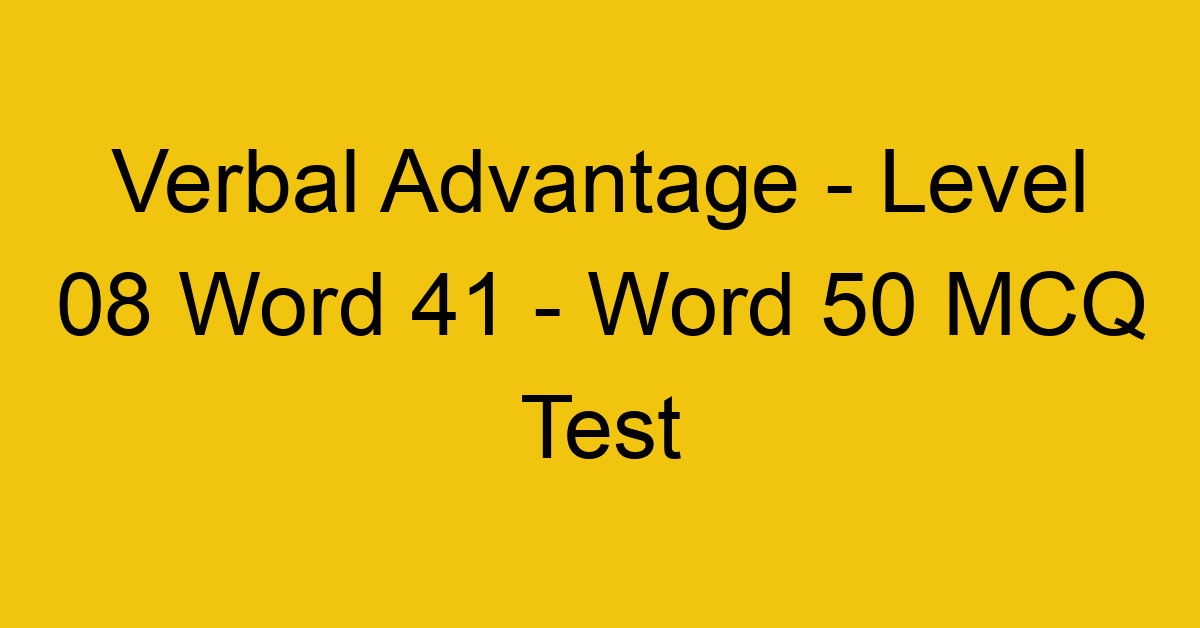Verbal Advantage - Level 08 Word 31 - Word 40 MCQ Test
Word List
- Word 31: Tantamount [TAN-tuh-MOWNT]
Equivalent; having equal force, effect, or value.
→
Tantamount comes from an Anglo-French phrase meaning “to amount to as much, be equal to,” and ultimately from the Latin tantus, which means “so much” or “so great.” In modern usage, when one thing is tantamount to another, it amounts to as much as the other, adds up to the same thing.
In his Dictionary of Contemporary American Usage (1957), Bergen Evans notes that the words paramount and tantamount “look deceptively alike but they mean very different things. Paramount means supreme in rank, preëminent [now written preeminent, without the dieresis]. Tantamount means equivalent, as in value, force, effect, or significance. It is usually followed by to (Your statement is tantamount to a confession). Tantamount is properly applied to acts and statements but not to material things.”
- Word 32: Pariah [puh-RY-uh]
An outcast; a person despised or rejected by society.
→
Pariah entered English in the early 1600s from Tamil (TAM-ul), one of the languages of India. In the traditional social system of India, people were divided into classes called castes (pronounced like casts). Unlike in the United States, where there has always been a great deal of class mobility, downward as well as upward, until recently the Indian caste system was rigid, and the pariah caste was one of the lowest on the social ladder. Its members worked chiefly as agricultural and domestic laborers and as servants to the British when India was a British colony. The third edition of The American Heritage Dictionary (1992) notes that until 1949 the pariahs “were also known as untouchables.”
From this sense of social inferiority, the word pariah came to be used in English of any person despised or rejected by society, an outcast. Although pariah is often used to describe criminals, outlaws, degenerates, and derelicts, the word does not always connote lawlessness, abject poverty, or antisocial behavior. Young people can become pariahs at school if they don’t wear the right clothing or do what is considered “cool.” In the 1960s, the hippies became pariahs in the eyes of the establishment because of their disdain for traditional values and opposition to the Vietnam War. And in the 1950s, during Senator Joe McCarthy’s infamous witchhunt for Communist subversives, many people who worked in the Hollywood film industry were blacklisted and treated like pariahs, social outcasts.
- Word 33: Germane [jur-MAYN]
Relevant, fitting, appropriate, precisely to the point.
→
Synonyms of germane include pertinent, suitable, applicable (APli-kuh-bul), apposite (AP-uh-zit), and apropos (AP-ruh-POH).
Antonyms include inappropriate, unsuitable, irrelevant, inapplicable, alien, extraneous, incongruous (in-KAHNG-groo-wus), and malapropos (MAL-ap-ruh-POH).
Germane comes through Middle English and Old French from the Latin germanus, which means “having the same parents.” When you have the same parents, you are closely allied by blood, and so related or akin. Out of this notion of family affinity grew the modern meaning of germane, having a close relationship to the subject at hand, closely tied to the point in question.
Germane, apposite, pertinent, and relevant are close in meaning.
Relevant is the weakest of the group and means simply related, connected, bearing upon a subject: “The chair of the meeting asked the participants to keep their comments relevant and to refrain from bringing up tangential issues.” Pertinent implies immediate, precise, and direct relevance: “Emily made several pertinent suggestions during the meeting that helped us focus on the problem.” Apposite implies relevance that is particularly appropriate, timely, or suitable to the occasion: “Emily made some apposite observations about the competition that made us reconsider our marketing strategy.” Our keyword, germane, implies a close connection or natural relationship that is highly fitting or appropriate: “Emily also presented a great deal of germane information in her report”; “The judge chided the defense attorney for voicing opinions that were not germane to the case.”
- Word 34: Licentious [ly-SEN-shus]
Sexually abandoned; lacking moral restraint, especially in sexual conduct.
→
Apparently there is something sensual about the letter l, because there are no fewer than nine synonyms of licentious that begin with l: lewd, loose, lustful, lecherous (LECH-ur-us), lascivious (luh-SIV-ee-us), libertine (LIB-ur-TEEN), lubricious (loo-BRISH-us), lickerish (LIK-ur-ish), and libidinous (li-BID-’n-us). Additional synonyms of licentious—and believe me, I’m selecting only the more challenging ones—include bawdy, wanton, ribald (word 42 of Level 7, rhymes with scribbled), prurient (PRUUR-ee-int), debauched (di-BAWCHT), dissolute (DIS-uh-loot), salacious (suhLAY-shus), and concupiscent (kahn-KYOO-pi-sint).
Had enough sexy words? All right, here are three antonyms of licentious to quell your lust: pure, chaste, and virtuous.
Licentious comes from the Latin licentia, freedom, leave, liberty, the source also of the English word license. By derivation licentious means taking license, and the word implies doing something one is not supposed to do, especially something sexually immoral. Dictionaries will tell you that licentious may be used to mean unrestrained by law, morality, or rules of correctness or propriety, as a licentious poet or a licentious rap musician. But the truth is that in current usage licentious almost always connotes unrestrained sexuality. Licentious poets write lewd or lustful poems, and licentious rap musicians hip-hop through their sexual escapades. A licentious person is someone who displays a lack of moral restraint regarding sexual conduct.
- Word 35: Superannuated [SOO-pur-AN-yoo-AY-tid]
Retired because of age, weakness, or ineffectiveness; old and worn out; outdated, outmoded, obsolete.
→
Synonyms of superannuated include timeworn, antiquated (AN-tiKWAY-tid), decrepit (di-KREP-it), passé (pa-SAY), and effete (iFEET).
Superannuated combines the prefix super-, meaning “beyond,” with the Latin annum, a year, and by derivation means beyond the useful years. That which is superannuated is too old for use, work, or service. The word may be used of a person who has reached the age of retirement, or of anything that has outlived its usefulness, that is old and worn out, as a superannuated car, a superannuated custom, a superannuated technology, or a superannuated idea.
- Word 36: Egregious [i-GREE-jus]
Conspicuously bad, remarkable or outstanding for some undesirable or offensive quality.
→
Synonyms of egregious include flagrant, outrageous, excessive, shocking, gross, monstrous, notorious, grievous (GREE-vus, two syllables please), and arrant (AR-unt).
Egregious comes from the Latin egregius, not of the common herd, and therefore select or outstanding. Egregious was once used to mean outstanding or remarkable, but this sense is long obsolete, and for at least three hundred years the word has most often been used to mean outstanding or remarkable in a bad way, conspicuously bad, offensive, or undesirable.
When you think of how many remarkably bad things there are in the world, it’s surprising that egregious isn’t used more often. Here are a few possible applications: an egregious crime, an egregious lie, an egregious insult, an egregious fool, an egregious oversight, an egregious mistake, and an egregious breach of human rights.
- Word 37: Vapid [VAP-id, rhymes with rapid]
Lifeless, dull, boring, flat, stale; lacking spirit, interest, or flavor.
→
Synonyms of vapid include unsavory, insipid, unpalatable, trite, prosaic (word 16 of Level 4), pedestrian, and jejune (ji-JOON, word 1 of Level 10).
Antonyms include lively, vigorous, vivid, animated, robust, vivacious (vi-VAY-shus), and emphatic.
Vapid comes from the Latin vapidus, which means spiritless, spoiled, flat. The word has remained true to its Latin root, and in modern usage vapid still applies to that which is lifeless, boring, or stale. Today we speak of vapid conversation, vapid beer, a vapid remark, or a vapid look in a person’s eyes.
- Word 38: Crotchet [KRAHCH-it, rhymes with watch it]
An odd notion or whim that one clings to stubbornly.
→
The corresponding adjective is crotchety. A crotchety person is full of crotchets, and therefore stubbornly eccentric. Crotchety is often applied to cantankerous old people who are set in their eccentric ways.
Crotchet comes from a Middle English word meaning a staff with a hook at the end. It is related to the familiar word crochet (kroh-SHAY), the form of needlework in which thread is looped with a hooked needle. Crotchet was once used to mean a reaping hook or a hooklike instrument. In modern usage, however, the most common meaning of crotchet is an odd notion or whim that hooks you or that you cling to stubbornly, as if with a hook.
Webster’s New World Dictionary, third edition (1997), says that crotchet “implies great eccentricity and connotes stubbornness in opposition to prevailing thought, usually on some insignificant point.” A crotchet may appear insignificant to others, but if it’s your crotchet, it’s far from trivial. Think of all the eccentric people you know, young or old, who cling to some odd notion or peculiar way of doing something and you will see that to the people who hold them, crotchets are heartfelt convictions.
In The Writer’s Art (1984), James J. Kilpatrick includes a long chapter in which he lists, without excuses or apology, one hundred of his crotchets about usage. “Every one…is as dear to me,” he writes, “as Audrey, the country wench, was dear to Touchstone. She was an ill-favored thing, sir, but his own. If I am tetchy about the placement of only, that’s it. I’m crotchety.”
And before your verbally advantaged guide gets crotchety about usage too, let’s move on to the next word.
- Word 39: Epigraph [EP-i-GRAF]
An inscription; especially, an inscription on a building or monument, or a brief quotation at the beginning of a literary composition that suggests or is germane to its theme.
→
Epigraph, epigram, and epitaph are close in meaning but sharply distinguished in usage.
An epitaph (EP-i-TAF) is an inscription on a gravestone or tomb in memory of the person buried. In The Devil’s Dictionary, a classic work of satirical lexicography, the acerbic and crotchety humorist Ambrose Bierce defined epitaph as “an inscription on a tomb, showing that virtues acquired by death have a retroactive effect.” Dorothy Parker, another American writer famous for her quick, mordant wit, once proposed these two epitaphs for herself: “Excuse my dust” and “This is on me.”
Epigram (EP-i-GRAM) has two meanings. Originally it referred to a short, witty poem—for example, this two-line ditty by Ogden Nash: “I like eels/’cept as meals.” Later epigram also came to mean a short, pointed saying that displays terse wit or a clever twist of thought. One of the greatest epigrammatists (EP-i-GRAM-uh-tists), or writers of epigrams, who ever lived was the nineteenth-century poet and playwright Oscar Wilde. Here are three examples of Wilde’s epigrams: “When people agree with me I always feel that I must be wrong.” “The only way to get rid of a temptation is to yield to it.” “[A cynic is] a man who knows the price of everything and the value of nothing.”
Our keyword, epigraph, is formed from the prefix epi-, meaning “on” or “above,” and the Greek verb graphein, to write. This Greek verb has influenced many English words, including electrocardiograph, an instrument for recording the beating of the heart; orthography, correct spelling; polygraph, otherwise known as a lie detector; and graphology, the study of handwriting. Whenever you see a word containing graph, you can reasonably assume that it has something to do with writing.
An epigraph by derivation means a writing on or above something; hence, an inscription. When you see words engraved on a building, a monument, or a statue, that’s an epigraph. When you see a brief quotation placed at the beginning of a book, a chapter, a poem, or the like, that is also an epigraph.
- Word 40: Expatiate [ek-SPAY-shee-ayt]
To elaborate, speak or write at great length.
→
Synonyms of expatiate include discourse (dis-KORS), expound (ek-SPOWND), and descant (des-KANT).
The verb to expatiate comes from the Latin expatiari, to wander. Expatiate originally meant to wander or walk about freely, but this sense is now rare. In current usage expatiate suggests wandering at will over a subject. When you expatiate on something, you elaborate, go into detail, speak or write about it at great length. The corresponding noun is expatiation (ek-SPAY-shee-AY-shin).






